外研版九年级下册 Module 3 Unit 3 Language in use. 课件 (共66张PPT)
文档属性
| 名称 | 外研版九年级下册 Module 3 Unit 3 Language in use. 课件 (共66张PPT) | 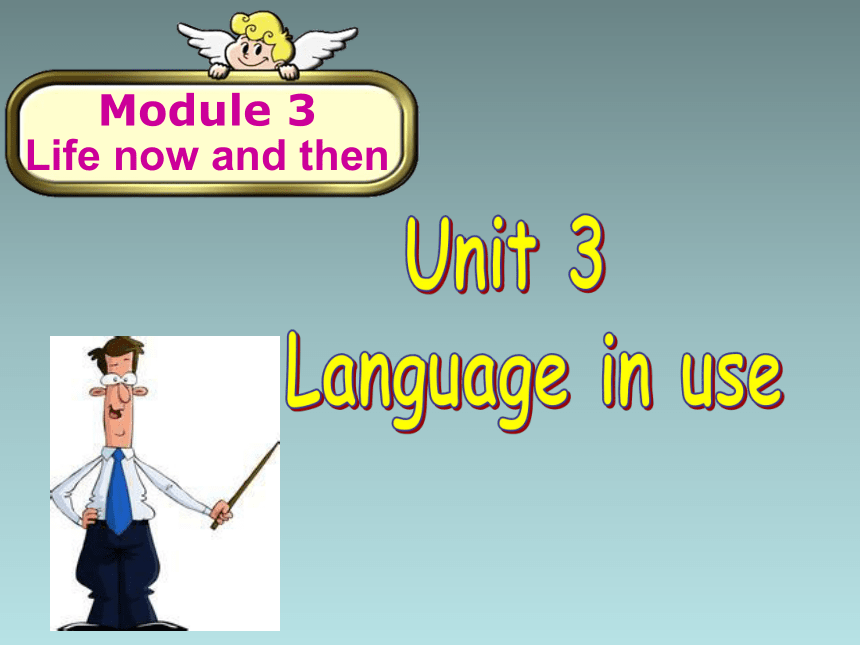 | |
| 格式 | ppt | ||
| 文件大小 | 12.3MB | ||
| 资源类型 | 教案 | ||
| 版本资源 | 外研版 | ||
| 科目 | 英语 | ||
| 更新时间 | 2022-08-16 18:36:33 | ||
图片预览

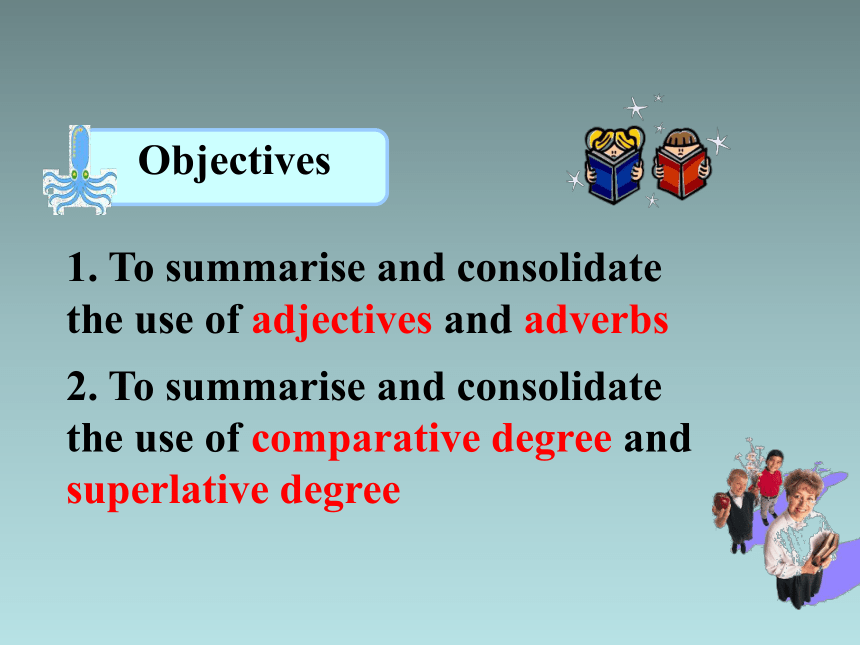

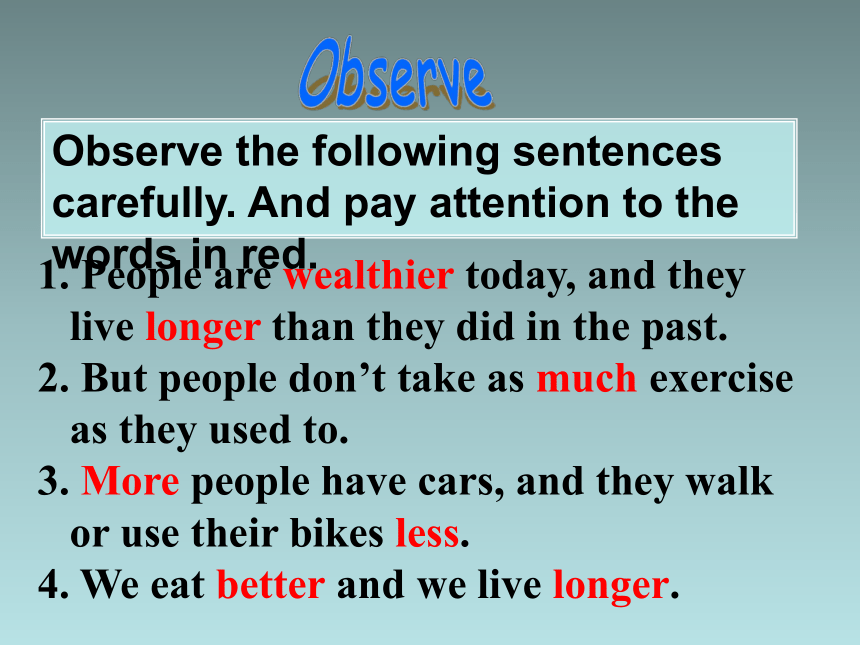
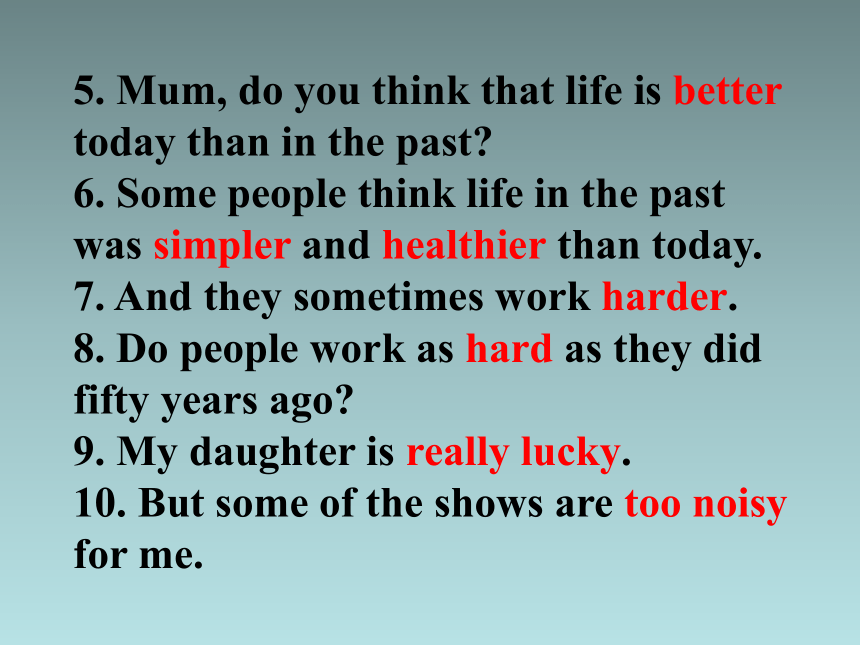

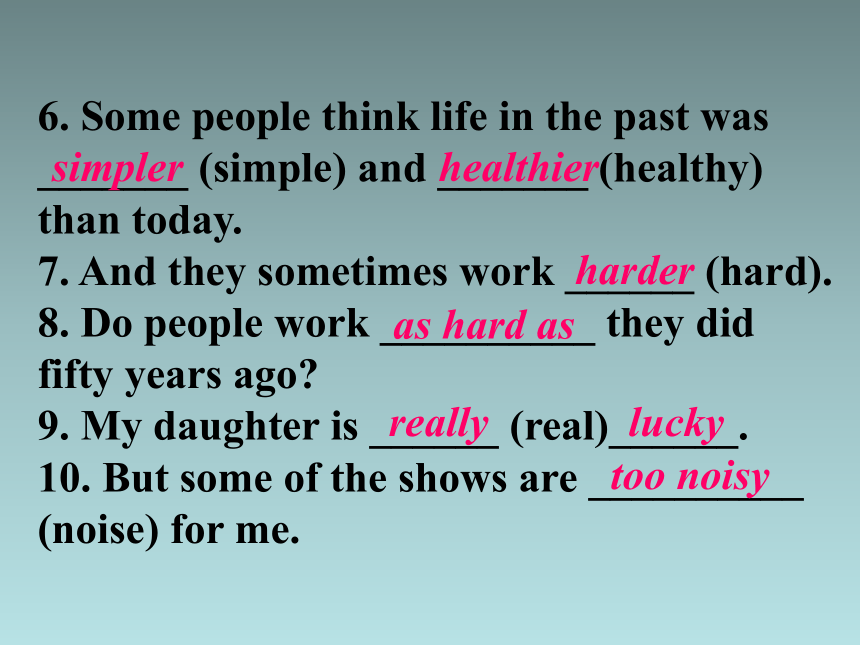
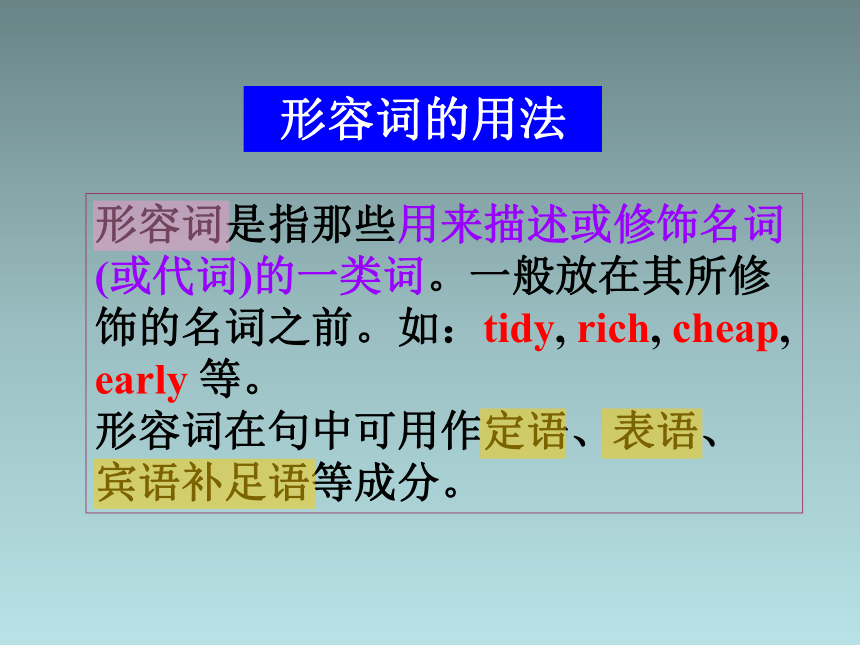
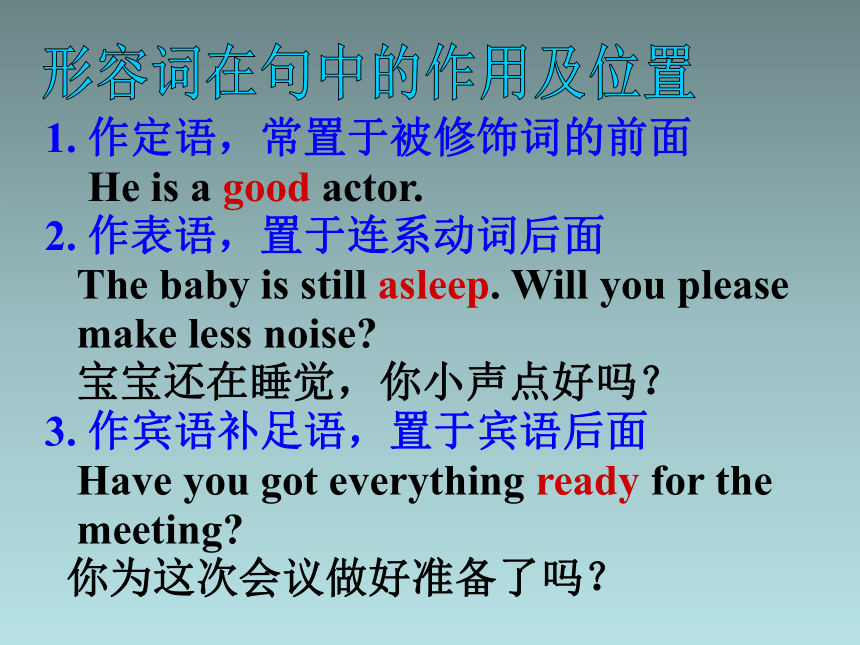
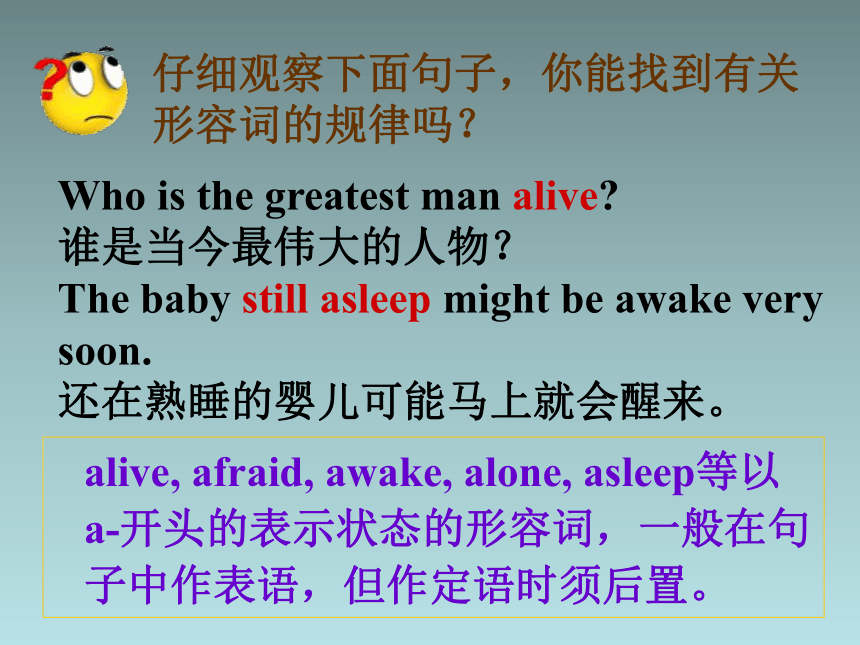
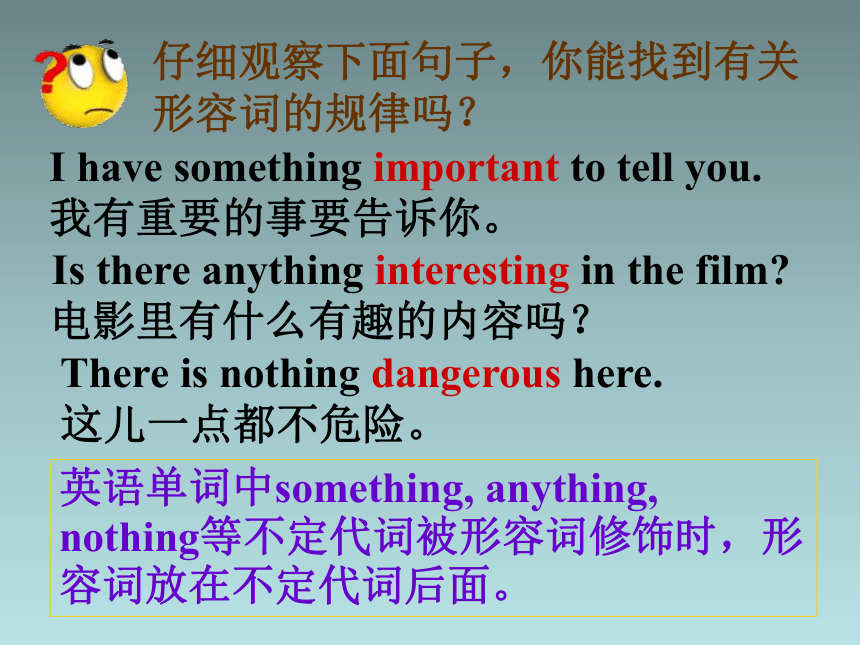
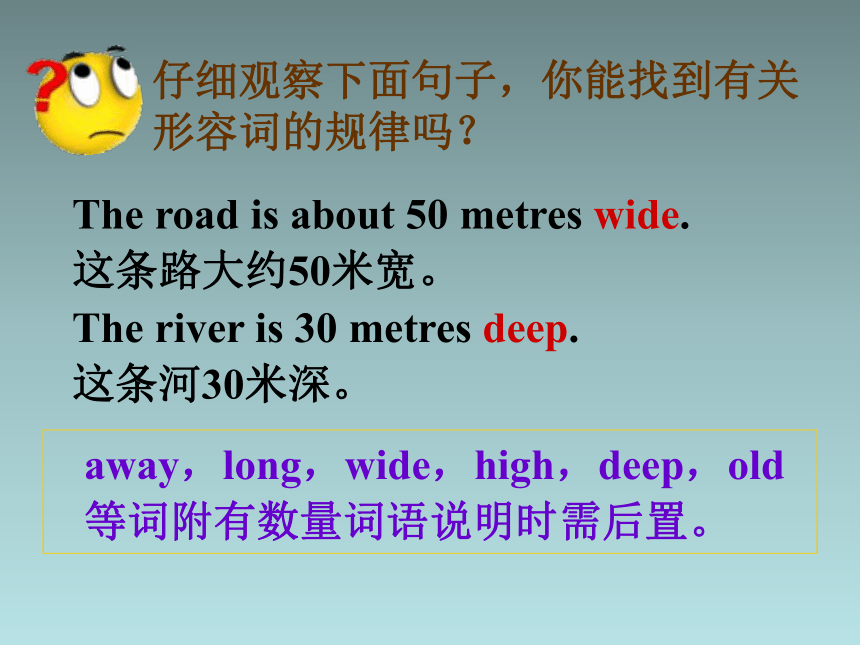
文档简介
(共66张PPT)
Module 3
Life now and then
1. To summarise and consolidate the use of adjectives and adverbs
2. To summarise and consolidate the use of comparative degree and superlative degree
Objectives
1. People are wealthier today, and they live longer than they did in the past.
2. But people don’t take as much exercise as they used to.
3. More people have cars, and they walk or use their bikes less.
4. We eat better and we live longer.
Observe the following sentences carefully. And pay attention to the words in red.
5. Mum, do you think that life is better today than in the past
6. Some people think life in the past was simpler and healthier than today.
7. And they sometimes work harder.
8. Do people work as hard as they did fifty years ago
9. My daughter is really lucky.
10. But some of the shows are too noisy for me.
1. People are _______ (wealthy) today, and they live _______ (long) than they did in the past.
2. But people don’t take __________ exercise _______ they used to.
3. More people have cars, and they walk or use their bikes ________ (little).
4. We eat _______ (well) and we live _______ (long).
5. Mum, do you think that life is _______ (good) today than in the past
wealthier
longer
as much
as
less
better
longer
better
go
Ready
6. Some people think life in the past was _______ (simple) and _______ (healthy) than today.
7. And they sometimes work ______ (hard).
8. Do people work __________ they did fifty years ago
9. My daughter is ______ (real)______.
10. But some of the shows are __________ (noise) for me.
simpler
healthier
harder
as hard as
really lucky
too noisy
形容词是指那些用来描述或修饰名词(或代词)的一类词。一般放在其所修饰的名词之前。如:tidy, rich, cheap, early 等。
形容词在句中可用作定语、表语、
宾语补足语等成分。
形容词的用法
作定语,常置于被修饰词的前面
He is a good actor.
2. 作表语,置于连系动词后面
The baby is still asleep. Will you please make less noise
宝宝还在睡觉,你小声点好吗?
3. 作宾语补足语,置于宾语后面
Have you got everything ready for the meeting
你为这次会议做好准备了吗?
alive, afraid, awake, alone, asleep等以a-开头的表示状态的形容词,一般在句子中作表语,但作定语时须后置。
Who is the greatest man alive
谁是当今最伟大的人物?
The baby still asleep might be awake very soon.
还在熟睡的婴儿可能马上就会醒来。
仔细观察下面句子,你能找到有关形容词的规律吗?
I have something important to tell you.
我有重要的事要告诉你。
Is there anything interesting in the film
电影里有什么有趣的内容吗?
There is nothing dangerous here.
这儿一点都不危险。
仔细观察下面句子,你能找到有关形容词的规律吗?
英语单词中something, anything, nothing等不定代词被形容词修饰时,形容词放在不定代词后面。
away,long,wide,high,deep,old等词附有数量词语说明时需后置。
The road is about 50 metres wide.
这条路大约50米宽。
The river is 30 metres deep.
这条河30米深。
仔细观察下面句子,你能找到有关形容词的规律吗?
形容词+介词短语或不定式短语作定语需后置。
He is a man full of energy.
他是一个充满活力的人。
The music pleasant to listen to interests me.
这动听的音乐使我感兴趣。
仔细观察下面句子,你能找到有关形容词的规律吗?
用and或or连接的两个形容词作定语须后置。
She has a family, happy and rich.
他有一个幸福美满的家庭。
A country, big or small, should be equal.
国不论大小应该平等。
仔细观察下面句子,你能找到有关形容词的规律吗?
形容词或形容词词组作状语使用时,可放在句首、句中或句尾。
Tired and hungry, he returned home.
他又累又饿地回到家里。
He went home, full of fear.
他满心恐惧地回到家里。
仔细观察下面句子,你能找到有关形容词的规律吗?
a big round black new wooden French table
a famous German medical school
some green eating apples
a beautiful little young British policemen
a pretty purple silk dress
the boy’s little nice red toy
仔细观察下面例子,你能找到有关形容词的规律吗?
多个形容词修饰名词的大体顺序是:
限定 描绘 大(小) 长 (短) 高 (低)
形状 年龄 新 (旧) 老 (少) 颜色 国籍 出处 材料 作用
类别等 +名词
下面顺口溜有助于你记忆:
品大新形色国料
副词是指在句子中表示行为或状态特征的词,一般用作状语,修饰动词、形容词、其他副词以及全句,表示时间、地点、程度、方式等概念。
副词的用法
类别 例词
简单副词
复合副词
由形容词+ly构成的副词
与形容词同形的副词
副词分类:按形式分类
now, then, there, here, quite, very, always, often, too, also, how, again
somewhat 有点 nowhere 无处
therefore 因此 somehow 不知怎么的
bravely, quickly, quietly, greatly, carefully, gladly, slowly, deeply, clearly, firmly
early, friendly, lively, enough, fast, long, high, late
类别 例词
方式副词
地点、方向副词
时间副词
程度副词
频率副词
副词分类:按意义分类
suddenly, rapidly, warmly, successfully, quickly, carefully, proudly, angrily
here, there, outside, inside, away, straight, upstairs, backwards
now, then, soon, still, tomorrow, yesterday, already, yet
always, usually, frequently, often, sometimes, seldom, rarely, never
very, quite, too, pretty, rather, extremely almost, nearly
类别 例词
句子副词
连接副词
关系副词(引导定语从句)
疑问副词
副词分类:按功用分类
fortunately, evidently, actually, obviously, well, indeed, yes, no
therefore, accordingly, moreover, besides, however, nevertheless,
otherwise, then
when, where, why
when, where, why, how
Our school is very beautiful.
我们的学校非常美丽。
It was rather hot that day.
He studies much harder now.
他现在学习更努力了。
仔细观察下面句子,你能找到什么规律?
副词修饰形容词、副词时,放在它所修饰的词的前面。
I don’t know him well enough.
我不够了解他。
The book is easy enough for kids.
这本书对孩子来说够容易了。
仔细观察下面句子,你能找到什么规律?
enough作为副词总是置于被修饰的形容词或副词后。
We haven’t enough food for you.
= We haven’t food enough for you.
我们没有足够的事物分给你们。
enough作为形容词时可位于名词前或者名词后。
仔细观察下面句子,你能找到什么规律?
频度副词、程度副词可放在be动词、情态动词和助动词之后,实意动词之前。
He always goes to school on foot.
他总是步行上学。
She has never been to Beijing.
她从没有去过北京。
He can hardly say a word.
他几乎一言不发。
仔细观察下面句子,你能找到什么规律?
They stayed at home last night.
昨晚他们在家。
Last night (时间副词) they stayed at home
(地点副词).
They’ll come back soon.
他们不久将会回来。
时间副词和地点副词一般位于句尾。如两种副词同时出现,则地点副词放在时间副词之前,也可将时间副词放在句首。
仔细观察下面句子,你能找到什么规律?
He carefully does his work.
他认真地做他的工作。
He does his work carefully.
Please listen carefully. 请认真地听讲。
Please listen to me carefully.
请认真地听我讲。
方式副词修饰及物动词可在及物动词前或宾语后,修饰不及物动词在修饰的动词后或在“介词+宾语”后。
仔细观察下面句子,你能找到什么规律?
The people here are very friendly.
这里的人都很友好。
They live on the floor below.
他们住在下一层楼。
副词作定语,一般放在被修饰的名词后。
仔细观察下面句子,你能找到什么规律?
The light is still on.
电灯还在亮着。
Her office is just above.
他的办公室就在上面。
副词作表语表示位置,位于系动词后。
仔细观察下面句子,你能找到什么规律?
I’m pleased to see you back.
看到你回来我很高兴。
We saw her off two days ago.
两天前我们为她送行。
副词作宾语补足语位于宾语后。
构成 原级 比较级 最高级
一般在词尾加-er, -est tall
long taller
longer tallest
longest
以字母e结尾的词,在词尾加-r,-st fine
late finer
later finest
latest
重读闭音节词且词尾只有一个辅音字母,双写辅音字母再加-er, -est big
thin bigger
thinner
biggest
thinnest
以“辅音字母 + y”结尾的双音节词,先把“y”改为“i”再加-er, -est easy
friendly easier
friendlier easiest
friendliest
多音节和部分双音节,在原级前加more, most interesting more interesting most interesting
规则变化:
不规则变化:
原级 比较级 最高级
good/well better best
bad/ill worse worst
little less least
many/much more most
far farther/further farthest/ furthest
old older/ elder oldest/ eldest
1. 规则变化:
1) 单音节的词在词尾直接加-er/-est,例如:
near → nearer/ nearest
hard → harder/ hardest
2) 部分双音节和多音节的词在词前加more/most,例如:
carefully → more/ most carefully
warmly → more/ most warmly
2. 常用不规则变化为:
原级 比较级 最高级
well better best
badly worse worst
much more most
little less least
far farther/ further farthest/ furthest
Ⅰ. 常用的比较级句型:
1. 比较级+than,表示“比……更……”
Health is more important than wealth.
健康比财富更重要。
He got up earlier than I did this morning.
今天早上他起得比我早。
2. 比较级+ and + 比较级,表示 “越来越……”
The story gets more and more exciting.
故事变得越来越激动人心。
Our lives are getting better and better.
我们的生活越来越好。
The more time you spend on it, the greater progress you will make.
你在这上面花的时间越多,你的进步就会越大。
The more he talked, the more excited he grew.
他越说越激动。
3. The + 比较级, the+比较级,表示“越……越……”
同级比较一般采用as… as…句型,否定句可以用not so/as…as…表示。例如:
He is as tall as his father.
他和他父亲一样高。
She is as busy as before.
她和过去一样忙。
I get up not so early as you.
我不如你起得早。
1. the + 最高级 + of/ in…
Ⅱ.常用的最高级表达:
Jim is the tallest of the three.
吉姆是三个人中最高的。
He is the most diligent student in his class.
他是班上最勤奋的学生。
2. 选择疑问句
It is the most interesting book I have ever read.
这是我所读过的最有趣的一本书。
3. the + 最高级 + 定语从句
Who is the tallest, Tom, Jack or Bill
汤姆、杰克和比尔,谁个子最高?
比较级和最高级的修饰语应置于其所修饰的形容词或副词之前。常见的比较级修饰语有much, still, a lot, even, far等。例如:
This is by far the most expensive bag in the shop.
这是目前这家商店里最贵的包。
常见的最高级修饰语有almost, by far, far, much等。例如:
He worked much harder then.
那时他工作要努力得多。
以下部分为课本练习,供老师在对答案时选择使用。
Complete the passage with the correct form of the words in brackets.
1
P22
For many people, life is a lot (1) ______ (easy) today. Medicine and diet are improving, and people are getting (2) ___________________ (healthy) and living (3) _______ (long). But communication is changing (4) _________ (fast) of all. Today, with the Internet, people can communicate (5) __________ (easily) than ever before with friends all over the world.
easier
healthier/more healthy
longer
(the) fastest
more easily
Not all the changes are (6) ______ (good) ones. More people drive cars instead of riding bikes, so they are not as (7) ____ (fit) as they were. Increasing traffic makes the roads (8) ____________ (crowded) than ever, and it also makes pollution (9) ______ (bad). We must all work harder to reduce pollution.
good
fit
more crowded
worse
Work in pairs. Look at the two pictures and talk about how the town has changed. Use the words in the box to help you.
2
P22
big buildings busy house modern more
shop street tall traffic tree
1. There are more cars in the street today than there were 50 years ago.
2. The buildings are much taller, much more beautiful and much newer.
3. The streets are much wider.
4. The environment is much better.
5. I can see people are much busier than before.
6. The life is much better than before.
7. There are more shops than before.
Complete the sentences with the words or expressions in the box.
3
P23
heat more than seldom spare speak up
1. We ______ have time to go on holiday.
2. We do not have much _______ time because we have important exams this year.
3. Never go out in the ________ of the day without a hat.
4. You have to _________ because the students in the back cannot hear you.
5. Mr Smith is _________ a teacher. Most of his pupils think of him as their friend.
seldom
spare
heat
speak up
more than
Read the email and find three examples that show life was harder in the past than it is today.
4
P23
Read the email again. Find sentences and write examples.
5
P24
1. People lived in very small houses, very close to each other, with no space for children to play.
2. _____________________________________
_____________________________________
__________________________
3. ____________________________________
____________________________________
____________________________________
____________________________________
____________________________________
The pollution from factories filled the air. People put their rubbish outside in the streets. There were many illnesses.
They didn’t always go to school, because they had to work instead. Many children started work in factories when they were only four or five years old. They worked twelve hours a day in dangerous jobs for very little money.
Listen and complete the table.
6
P24
Grandmother Mother
Age to start school
Age to start work
Age to get married
Number of children
Age to stop working
8 years old
6 years old
22 years old
14 years old
18 years old
24 years old
four children
one child
50 years old
55 years old
Tapescript:
Write a passage comparing the lives of the speaker’s grandmother and mother in Activity 6.
7
P24
The speaker’s grandmother and mother have lived very different lives. Her grandmother had a much bigger family…
The speaker’s grandmother and mother had very different lives. Her grandmother had a much bigger family of four children. The speaker’s mother has only one child. Her grandmother and mother had different childhoods. Her grandmother started school later. She didn’t start school until she was eight. Her mother started school earlier, when she was six. Her grandmother didn’t have many years of education. She started work when she was fourteen. Her mother was luckier, because she went to university after she finished school, and started work when she was twenty-two.
Adjective: used for describing a noun or pronoun.
Adverb: used for describing a verb, an adjective, another adverb, or a whole sentence.
单项选择。
1. — You look _______ today.
— Yes. I stayed up late last night to
watch a talk show.
A. easy B. warm
C. tired D. smart
2. Fishing with Dad was so _______ for
little Sam that he almost fell asleep.
A. excited B. exciting
C. bored D. boring
3. My old neighbour Charles felt _____
after his children moved out.
A. lonely B. safely
C. angrily D. happily
4. The city of Harbin is beautiful all the
year around, _______ in winter. Ice
lanterns decorate streets and attract
plenty of tourists.
A. especially B. generally C. probably
5. She always does very well in the English exams. But she can _______ understand English radio programs.
A. always B. hardly C. already D. easily
6. We arrived at the station too early and had _______ to go, so we sat there and chatted with each other.
A. somewhere B. anywhere
C. everywhere D. nowhere
7. This movie wasn’t _______. He fell asleep half way through it.
A. interesting enough
B. enough interesting
C. interested enough
D. enough interested
8. Tony is not as clever as Lucy, but he works _______ than her.
A. hard B. harder
C. hardest D. the hardest
9. — Many boy students think maths is
________ English.
— I agree. I’m weak in English.
A. much difficult than
B. so difficult as
C. less difficult than
D. more difficult than
10. My grandpa told a good story, but I told a _______ one.
A. good B. better
C. best D. worse
11. — What do you think of the film So
Young directed by Zhao Wei
— Wonderful. I think it’s ______
than the other films about youth in
recent years.
A. the best B. the worst
C. much better D. much worse
12. Lanzhou is the only capital city that the Yellow River, the second _______ river in China, passes through.
A. long B. longest
C. longer D. length
13. I know you are shorter than your brothers, but you run ________.
A. more faster B. fastest
C. more fast D. fast
1. --- What do you think of the woman
singer (2015呼和浩特)
--- Her voice sounds ____. I like her songs.
A. sweet B. sweetly
C. bad D. badly
2. I jumped ____ than Bill in the sports meet last year. (2015北京)
A. high B. higher
C. highest D. the highest
3. My time in the middle school was one of____ periods of my life. (2015杭州)
A. exciting B. more exciting
C. the more exciting
D. the most exciting
4. The boy looked _____ because he didn’t pass his maths exam. (2015广州)
A. sad B. sadness
C. saddest D. sadly
1. Finish the exercises in Learning English.
2. Preview the new words and expressions in Module 4.
Module 3
Life now and then
1. To summarise and consolidate the use of adjectives and adverbs
2. To summarise and consolidate the use of comparative degree and superlative degree
Objectives
1. People are wealthier today, and they live longer than they did in the past.
2. But people don’t take as much exercise as they used to.
3. More people have cars, and they walk or use their bikes less.
4. We eat better and we live longer.
Observe the following sentences carefully. And pay attention to the words in red.
5. Mum, do you think that life is better today than in the past
6. Some people think life in the past was simpler and healthier than today.
7. And they sometimes work harder.
8. Do people work as hard as they did fifty years ago
9. My daughter is really lucky.
10. But some of the shows are too noisy for me.
1. People are _______ (wealthy) today, and they live _______ (long) than they did in the past.
2. But people don’t take __________ exercise _______ they used to.
3. More people have cars, and they walk or use their bikes ________ (little).
4. We eat _______ (well) and we live _______ (long).
5. Mum, do you think that life is _______ (good) today than in the past
wealthier
longer
as much
as
less
better
longer
better
go
Ready
6. Some people think life in the past was _______ (simple) and _______ (healthy) than today.
7. And they sometimes work ______ (hard).
8. Do people work __________ they did fifty years ago
9. My daughter is ______ (real)______.
10. But some of the shows are __________ (noise) for me.
simpler
healthier
harder
as hard as
really lucky
too noisy
形容词是指那些用来描述或修饰名词(或代词)的一类词。一般放在其所修饰的名词之前。如:tidy, rich, cheap, early 等。
形容词在句中可用作定语、表语、
宾语补足语等成分。
形容词的用法
作定语,常置于被修饰词的前面
He is a good actor.
2. 作表语,置于连系动词后面
The baby is still asleep. Will you please make less noise
宝宝还在睡觉,你小声点好吗?
3. 作宾语补足语,置于宾语后面
Have you got everything ready for the meeting
你为这次会议做好准备了吗?
alive, afraid, awake, alone, asleep等以a-开头的表示状态的形容词,一般在句子中作表语,但作定语时须后置。
Who is the greatest man alive
谁是当今最伟大的人物?
The baby still asleep might be awake very soon.
还在熟睡的婴儿可能马上就会醒来。
仔细观察下面句子,你能找到有关形容词的规律吗?
I have something important to tell you.
我有重要的事要告诉你。
Is there anything interesting in the film
电影里有什么有趣的内容吗?
There is nothing dangerous here.
这儿一点都不危险。
仔细观察下面句子,你能找到有关形容词的规律吗?
英语单词中something, anything, nothing等不定代词被形容词修饰时,形容词放在不定代词后面。
away,long,wide,high,deep,old等词附有数量词语说明时需后置。
The road is about 50 metres wide.
这条路大约50米宽。
The river is 30 metres deep.
这条河30米深。
仔细观察下面句子,你能找到有关形容词的规律吗?
形容词+介词短语或不定式短语作定语需后置。
He is a man full of energy.
他是一个充满活力的人。
The music pleasant to listen to interests me.
这动听的音乐使我感兴趣。
仔细观察下面句子,你能找到有关形容词的规律吗?
用and或or连接的两个形容词作定语须后置。
She has a family, happy and rich.
他有一个幸福美满的家庭。
A country, big or small, should be equal.
国不论大小应该平等。
仔细观察下面句子,你能找到有关形容词的规律吗?
形容词或形容词词组作状语使用时,可放在句首、句中或句尾。
Tired and hungry, he returned home.
他又累又饿地回到家里。
He went home, full of fear.
他满心恐惧地回到家里。
仔细观察下面句子,你能找到有关形容词的规律吗?
a big round black new wooden French table
a famous German medical school
some green eating apples
a beautiful little young British policemen
a pretty purple silk dress
the boy’s little nice red toy
仔细观察下面例子,你能找到有关形容词的规律吗?
多个形容词修饰名词的大体顺序是:
限定 描绘 大(小) 长 (短) 高 (低)
形状 年龄 新 (旧) 老 (少) 颜色 国籍 出处 材料 作用
类别等 +名词
下面顺口溜有助于你记忆:
品大新形色国料
副词是指在句子中表示行为或状态特征的词,一般用作状语,修饰动词、形容词、其他副词以及全句,表示时间、地点、程度、方式等概念。
副词的用法
类别 例词
简单副词
复合副词
由形容词+ly构成的副词
与形容词同形的副词
副词分类:按形式分类
now, then, there, here, quite, very, always, often, too, also, how, again
somewhat 有点 nowhere 无处
therefore 因此 somehow 不知怎么的
bravely, quickly, quietly, greatly, carefully, gladly, slowly, deeply, clearly, firmly
early, friendly, lively, enough, fast, long, high, late
类别 例词
方式副词
地点、方向副词
时间副词
程度副词
频率副词
副词分类:按意义分类
suddenly, rapidly, warmly, successfully, quickly, carefully, proudly, angrily
here, there, outside, inside, away, straight, upstairs, backwards
now, then, soon, still, tomorrow, yesterday, already, yet
always, usually, frequently, often, sometimes, seldom, rarely, never
very, quite, too, pretty, rather, extremely almost, nearly
类别 例词
句子副词
连接副词
关系副词(引导定语从句)
疑问副词
副词分类:按功用分类
fortunately, evidently, actually, obviously, well, indeed, yes, no
therefore, accordingly, moreover, besides, however, nevertheless,
otherwise, then
when, where, why
when, where, why, how
Our school is very beautiful.
我们的学校非常美丽。
It was rather hot that day.
He studies much harder now.
他现在学习更努力了。
仔细观察下面句子,你能找到什么规律?
副词修饰形容词、副词时,放在它所修饰的词的前面。
I don’t know him well enough.
我不够了解他。
The book is easy enough for kids.
这本书对孩子来说够容易了。
仔细观察下面句子,你能找到什么规律?
enough作为副词总是置于被修饰的形容词或副词后。
We haven’t enough food for you.
= We haven’t food enough for you.
我们没有足够的事物分给你们。
enough作为形容词时可位于名词前或者名词后。
仔细观察下面句子,你能找到什么规律?
频度副词、程度副词可放在be动词、情态动词和助动词之后,实意动词之前。
He always goes to school on foot.
他总是步行上学。
She has never been to Beijing.
她从没有去过北京。
He can hardly say a word.
他几乎一言不发。
仔细观察下面句子,你能找到什么规律?
They stayed at home last night.
昨晚他们在家。
Last night (时间副词) they stayed at home
(地点副词).
They’ll come back soon.
他们不久将会回来。
时间副词和地点副词一般位于句尾。如两种副词同时出现,则地点副词放在时间副词之前,也可将时间副词放在句首。
仔细观察下面句子,你能找到什么规律?
He carefully does his work.
他认真地做他的工作。
He does his work carefully.
Please listen carefully. 请认真地听讲。
Please listen to me carefully.
请认真地听我讲。
方式副词修饰及物动词可在及物动词前或宾语后,修饰不及物动词在修饰的动词后或在“介词+宾语”后。
仔细观察下面句子,你能找到什么规律?
The people here are very friendly.
这里的人都很友好。
They live on the floor below.
他们住在下一层楼。
副词作定语,一般放在被修饰的名词后。
仔细观察下面句子,你能找到什么规律?
The light is still on.
电灯还在亮着。
Her office is just above.
他的办公室就在上面。
副词作表语表示位置,位于系动词后。
仔细观察下面句子,你能找到什么规律?
I’m pleased to see you back.
看到你回来我很高兴。
We saw her off two days ago.
两天前我们为她送行。
副词作宾语补足语位于宾语后。
构成 原级 比较级 最高级
一般在词尾加-er, -est tall
long taller
longer tallest
longest
以字母e结尾的词,在词尾加-r,-st fine
late finer
later finest
latest
重读闭音节词且词尾只有一个辅音字母,双写辅音字母再加-er, -est big
thin bigger
thinner
biggest
thinnest
以“辅音字母 + y”结尾的双音节词,先把“y”改为“i”再加-er, -est easy
friendly easier
friendlier easiest
friendliest
多音节和部分双音节,在原级前加more, most interesting more interesting most interesting
规则变化:
不规则变化:
原级 比较级 最高级
good/well better best
bad/ill worse worst
little less least
many/much more most
far farther/further farthest/ furthest
old older/ elder oldest/ eldest
1. 规则变化:
1) 单音节的词在词尾直接加-er/-est,例如:
near → nearer/ nearest
hard → harder/ hardest
2) 部分双音节和多音节的词在词前加more/most,例如:
carefully → more/ most carefully
warmly → more/ most warmly
2. 常用不规则变化为:
原级 比较级 最高级
well better best
badly worse worst
much more most
little less least
far farther/ further farthest/ furthest
Ⅰ. 常用的比较级句型:
1. 比较级+than,表示“比……更……”
Health is more important than wealth.
健康比财富更重要。
He got up earlier than I did this morning.
今天早上他起得比我早。
2. 比较级+ and + 比较级,表示 “越来越……”
The story gets more and more exciting.
故事变得越来越激动人心。
Our lives are getting better and better.
我们的生活越来越好。
The more time you spend on it, the greater progress you will make.
你在这上面花的时间越多,你的进步就会越大。
The more he talked, the more excited he grew.
他越说越激动。
3. The + 比较级, the+比较级,表示“越……越……”
同级比较一般采用as… as…句型,否定句可以用not so/as…as…表示。例如:
He is as tall as his father.
他和他父亲一样高。
She is as busy as before.
她和过去一样忙。
I get up not so early as you.
我不如你起得早。
1. the + 最高级 + of/ in…
Ⅱ.常用的最高级表达:
Jim is the tallest of the three.
吉姆是三个人中最高的。
He is the most diligent student in his class.
他是班上最勤奋的学生。
2. 选择疑问句
It is the most interesting book I have ever read.
这是我所读过的最有趣的一本书。
3. the + 最高级 + 定语从句
Who is the tallest, Tom, Jack or Bill
汤姆、杰克和比尔,谁个子最高?
比较级和最高级的修饰语应置于其所修饰的形容词或副词之前。常见的比较级修饰语有much, still, a lot, even, far等。例如:
This is by far the most expensive bag in the shop.
这是目前这家商店里最贵的包。
常见的最高级修饰语有almost, by far, far, much等。例如:
He worked much harder then.
那时他工作要努力得多。
以下部分为课本练习,供老师在对答案时选择使用。
Complete the passage with the correct form of the words in brackets.
1
P22
For many people, life is a lot (1) ______ (easy) today. Medicine and diet are improving, and people are getting (2) ___________________ (healthy) and living (3) _______ (long). But communication is changing (4) _________ (fast) of all. Today, with the Internet, people can communicate (5) __________ (easily) than ever before with friends all over the world.
easier
healthier/more healthy
longer
(the) fastest
more easily
Not all the changes are (6) ______ (good) ones. More people drive cars instead of riding bikes, so they are not as (7) ____ (fit) as they were. Increasing traffic makes the roads (8) ____________ (crowded) than ever, and it also makes pollution (9) ______ (bad). We must all work harder to reduce pollution.
good
fit
more crowded
worse
Work in pairs. Look at the two pictures and talk about how the town has changed. Use the words in the box to help you.
2
P22
big buildings busy house modern more
shop street tall traffic tree
1. There are more cars in the street today than there were 50 years ago.
2. The buildings are much taller, much more beautiful and much newer.
3. The streets are much wider.
4. The environment is much better.
5. I can see people are much busier than before.
6. The life is much better than before.
7. There are more shops than before.
Complete the sentences with the words or expressions in the box.
3
P23
heat more than seldom spare speak up
1. We ______ have time to go on holiday.
2. We do not have much _______ time because we have important exams this year.
3. Never go out in the ________ of the day without a hat.
4. You have to _________ because the students in the back cannot hear you.
5. Mr Smith is _________ a teacher. Most of his pupils think of him as their friend.
seldom
spare
heat
speak up
more than
Read the email and find three examples that show life was harder in the past than it is today.
4
P23
Read the email again. Find sentences and write examples.
5
P24
1. People lived in very small houses, very close to each other, with no space for children to play.
2. _____________________________________
_____________________________________
__________________________
3. ____________________________________
____________________________________
____________________________________
____________________________________
____________________________________
The pollution from factories filled the air. People put their rubbish outside in the streets. There were many illnesses.
They didn’t always go to school, because they had to work instead. Many children started work in factories when they were only four or five years old. They worked twelve hours a day in dangerous jobs for very little money.
Listen and complete the table.
6
P24
Grandmother Mother
Age to start school
Age to start work
Age to get married
Number of children
Age to stop working
8 years old
6 years old
22 years old
14 years old
18 years old
24 years old
four children
one child
50 years old
55 years old
Tapescript:
Write a passage comparing the lives of the speaker’s grandmother and mother in Activity 6.
7
P24
The speaker’s grandmother and mother have lived very different lives. Her grandmother had a much bigger family…
The speaker’s grandmother and mother had very different lives. Her grandmother had a much bigger family of four children. The speaker’s mother has only one child. Her grandmother and mother had different childhoods. Her grandmother started school later. She didn’t start school until she was eight. Her mother started school earlier, when she was six. Her grandmother didn’t have many years of education. She started work when she was fourteen. Her mother was luckier, because she went to university after she finished school, and started work when she was twenty-two.
Adjective: used for describing a noun or pronoun.
Adverb: used for describing a verb, an adjective, another adverb, or a whole sentence.
单项选择。
1. — You look _______ today.
— Yes. I stayed up late last night to
watch a talk show.
A. easy B. warm
C. tired D. smart
2. Fishing with Dad was so _______ for
little Sam that he almost fell asleep.
A. excited B. exciting
C. bored D. boring
3. My old neighbour Charles felt _____
after his children moved out.
A. lonely B. safely
C. angrily D. happily
4. The city of Harbin is beautiful all the
year around, _______ in winter. Ice
lanterns decorate streets and attract
plenty of tourists.
A. especially B. generally C. probably
5. She always does very well in the English exams. But she can _______ understand English radio programs.
A. always B. hardly C. already D. easily
6. We arrived at the station too early and had _______ to go, so we sat there and chatted with each other.
A. somewhere B. anywhere
C. everywhere D. nowhere
7. This movie wasn’t _______. He fell asleep half way through it.
A. interesting enough
B. enough interesting
C. interested enough
D. enough interested
8. Tony is not as clever as Lucy, but he works _______ than her.
A. hard B. harder
C. hardest D. the hardest
9. — Many boy students think maths is
________ English.
— I agree. I’m weak in English.
A. much difficult than
B. so difficult as
C. less difficult than
D. more difficult than
10. My grandpa told a good story, but I told a _______ one.
A. good B. better
C. best D. worse
11. — What do you think of the film So
Young directed by Zhao Wei
— Wonderful. I think it’s ______
than the other films about youth in
recent years.
A. the best B. the worst
C. much better D. much worse
12. Lanzhou is the only capital city that the Yellow River, the second _______ river in China, passes through.
A. long B. longest
C. longer D. length
13. I know you are shorter than your brothers, but you run ________.
A. more faster B. fastest
C. more fast D. fast
1. --- What do you think of the woman
singer (2015呼和浩特)
--- Her voice sounds ____. I like her songs.
A. sweet B. sweetly
C. bad D. badly
2. I jumped ____ than Bill in the sports meet last year. (2015北京)
A. high B. higher
C. highest D. the highest
3. My time in the middle school was one of____ periods of my life. (2015杭州)
A. exciting B. more exciting
C. the more exciting
D. the most exciting
4. The boy looked _____ because he didn’t pass his maths exam. (2015广州)
A. sad B. sadness
C. saddest D. sadly
1. Finish the exercises in Learning English.
2. Preview the new words and expressions in Module 4.
同课章节目录
- Module 1 Travel
- Unit 1 We toured the city by bus and by taxi
- Unit 2 It's a long story.
- Unit 3 Language in use
- Module 2 Education
- Unit 1 They don't sit in rows.
- Unit 2 What do I like best about school?
- Unit 3 Language in use
- Module 3 Life now and then
- Unit 1 They sometimes work harder.
- Unit 2 I think life is better today.
- Unit 3 Language in use.
- Module 4 Rules and suggestions
- Unit 1 You must be careful of falling stones.
- Unit 2 we must keep the camp clean.
- Unit 3 Language in use.
- Revison A
- Module 5 Look after yourself
- Unit 1 We'd better get you to hospital.
- Unit 2 Get off the sofa!
- Unit 3 Language in use.
- Module 6 Eating togethe
- Unit 1 When is the school-leavers' party?
- Unit 2 Knives and forks are used for most Western
- Unit 3 Language in use
- Module 7 English for you and me
- Unit 1 Have you ever been to an English corner?
- Unit 2 We all own English.
- Unit 3 Language in use
- Module 8 My future life
- Unit 1 Here's to our friendship and the future
- Unit 2 I know that you will be better at maths.
- Unit 3 Language in use
- Revison B
